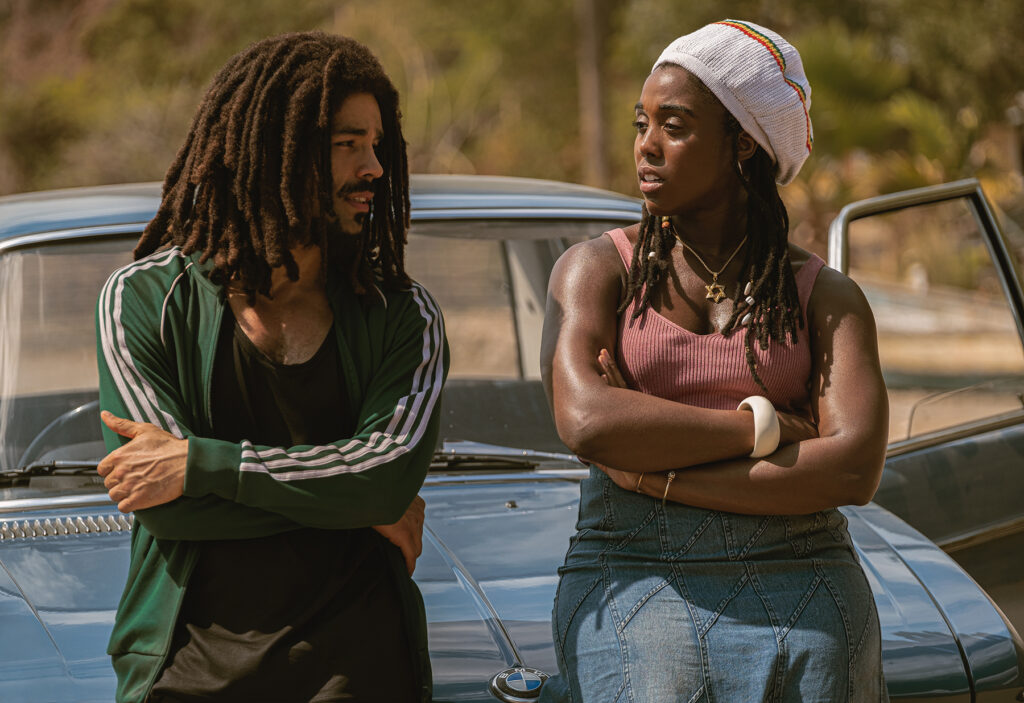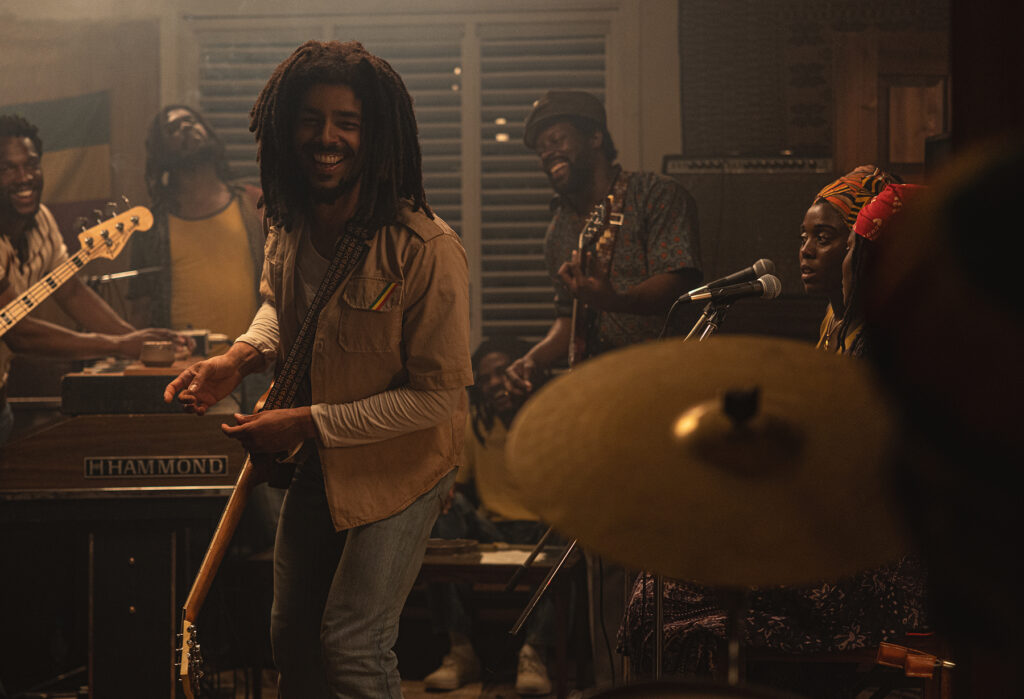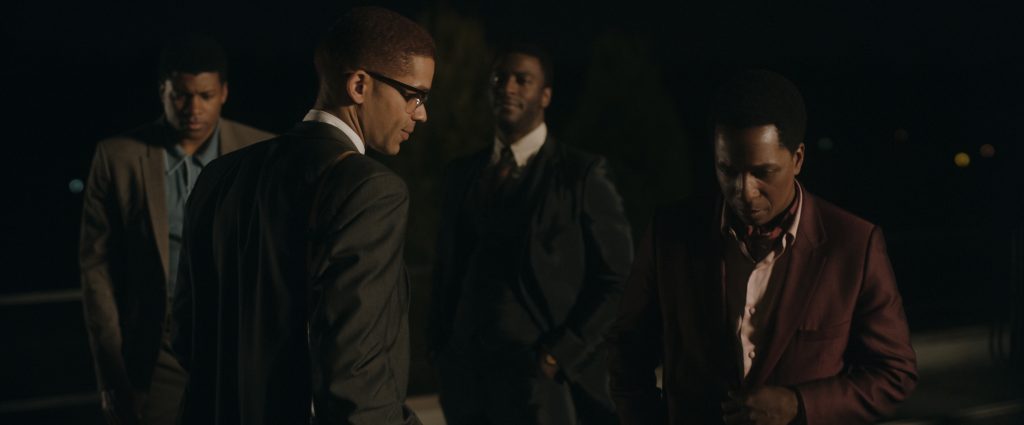February 13, 2024
by Carla Hay

Directed by Reinaldo Marcus Green
Culture Representation: Taking place from 1976 to 1978 (with flashbacks to the 1940s, 1950s, and 1960s), in Jamaica and other parts of the world, the dramatic biopic “Bob Marley: One Love” features a predominantly black cast of characters (with some white people) portraying people connected in some way to reggae superstar Bob Marley.
Culture Clash: Bob Marley is plagued by threats of violence from people who see him as a political figure or a musical rival; a troubled marriage to his backup singer Rita Marley; and childhood memories of being abandoned by his father.
Culture Audience: “Bob Marley: One Love” will appeal primarily to people who are fans of Bob Marley and celebrity biopics, but this music-oriented drama hits a lot of the same wrong notes.

“Bob Marley: One Love” alternates between being bland and sloppy. The end result is that this disappointing biopic looks like a boring parody of a music legend’s life story. The dreadlock wigs look too fake and are a distraction. Although some of the cast members seem to be doing their best to salvage this mishandled misfire, “Bob Marley: One Love” is torpedoed by jumbled direction and a messy screenplay. Bob Marley, the pioneering reggae legend from Jamaica, died of skin cancer (acral lentiginous melanoma) in 1981, at the age of 36. Unfortunately, this biopic does not do full justice to his influential legacy.
Directed by Reinaldo Marcus Green, “Bob Marley: One Love” was co-written by Green, Terence Winter, Frank E. Flowers and Zach Baylin. Green and Baylin’s previous film is 2021’s “King Richard,” the Oscar-winning biopic starring Will Smith as Richard Williams, father of tennis legends Serena Williams and Venus Williams. Green directed “King Richard,” and Baylin received an Oscar nomination for Best Original Screenplay for the movie. Whereas “King Richard” had an easy-to-follow timeline told in chronological order, “Bob Marley: One Love” has a scrambled timeline that will be confusing to many viewers who are unfamiliar with Bob Marley’s story.
Clearly, these filmmakers are capable of making award-worthy movies. What went wrong with this Bob Marley biopic? It starts with the screenplay, which might have suffered from “too many cooks in the kitchen” syndrome. It might explain why the screenplay seems to be watered-down and devoid of anything truly electrifying. (For the purposes of this review, the real Bob Marley will be referred to as Bob Marley, while the Bob Marley character in the movie will be referred to as Bob.)
“Bob Marley: One Love” has an annoying tendency to show Bob Marley as a successful adult musician (played by Kingsley Ben-Adir) relying heavily on flashbacks to his childhood and teen years whenever the adult Bob wants to get inspiration to write a song. (Nolan Collignon portrays Bob as a child of about 6 or 7 years old. Quan-Dajai Henriques portrays Bob as a teenager.) Based on the loads of information available about the real Bob Marley, he clearly did not draw inspiration mainly from his childhood memories.
In fact, Bob Marley’s life philosophy was to focus on the present and not dwell on the past. It seems disrespectful and very gimmicky for the “Bob Marley: One Love” filmmakers to thrown in hazy-looking, dreamlike sequences of Bob experiencing the trauma of being insulted and abandoned by his father as a child before he writes a song.
Bob Marley (whose birth name was Robert Nesta Marley) was born in the small town of Nine Mile, Jamaica, to a white British plantation overseer named Norval Sinclair Marley and a black Jamaican named Cedella Malcolm, who worked on the plantation. In “Bob Marley: One Love,” Norval is portrayed by Daniel Melville Jr., while Cedella is portrayed by Nadine Marshall.
In real life, Norval Marley and Cedella Marley were married. Norval died when Bob Marley was 10 years old. Cedella then married an American civil servant named Edward Booker, changed her last name to Booker, and had two other sons from this marriage: Richard and Anthony Booker. Cedella also moved to the United States because of this marriage. Edward, Richard and Anthony are not in this movie.
In “Bob Marley: One Love,” Bob’s childhood is depicted as Norval (dressed in a British military uniform, because the real Norval claimed to be a veteran of the British Royal Marines) being an absentee father who rejected and abandoned Bob. Cedella was then left to raise Bob as a single mother. And because her relationship with Bob’s stepfather Edward Booker isn’t in the movie, “Bob Marley: One Love” gives the impression that Bob didn’t have a father figure in his life during his childhood and teen years.
The flashbacks to Bob’s teen years also seem superficial and not entirely accurate. Bob and his teenage sweetheart Rita (played by Nia Ashi) form an emotional bond over feeling like outcasts in their school. They both talk about being bullied and teased by their peers because of the color of their skin: Bob (who called himself or Rob or Robbie back then) got flack for being “too light-skinned,” and Rita for being “too dark-skinned.”
Bob and Rita share a love of music, and she eventually becomes a backup singer in his band. Rita is also the person who introduces Bob to Rastafarianism. The movie has the expected scenes of Bob and many other Rastafarians smoking marijuana.
Bob’s earliest days as a musician are shown fleetingly and without much substance— unless you think it’s fascinating to see a teenage Bob Marley and his band show up at a rehearsal/recording studio space and have the owner wave a gun at them to prevent them from going inside because he thinks the band looks too young to be professional musicians. The owner then changes his mind when he hears Bob sing. Yes, it’s that kind of movie.
Years later, when Bob and Rita (played by Lashana Lynch) are married parents and experiencing Bob’s growing fame, the rosy glow of their teenage romance has long since dimmed and given way to the harsh realities of his infidelities, including having children with other women, with Rita being a caregiver for most of these out-of-wedlock children. This fact is mentioned quickly during an argument that Bob and Rita have outside a music industry party in Europe.
The argument starts because Bob, like most cheaters, is irrationally jealous and accusatory over suspicions that his main partner is being unfaithful too. Bob has a violent temper and is seen lashing out at any man whom Bob thinks might be sexually involved with Rita. The movie doesn’t go into further details about Bob’s extramarital affairs. There are a few scenes where Rita glares angrily at women who are hanging around like groupies. “Bob Marley: One Love” is so poorly written and clumsily directed, these marital problems are dropped in the movie like snippets of a soap opera and then ignored.
“Bob Marley: One Love” is mainly just a series of scenes where he has conflicts and dilemmas over whether or not to perform the One Love Peace Concert (which took place at in 1978, at the National Stadium in Kingston, Jamaica); how to protect his family from threats of violence; and creative control over his music. The majority of the film takes place from 1976 to 1978, with the One Love Peace Concert set up as the movie’s expected climax, just like the Live Aid concert was for the 2018 Queen biopic “Bohemian Rhapsody.”
“Bob Marley: One Love” shows how Bob was getting pressure from various people with different agendas on whether or not to do the concert, which was during a time of enormous political upheaval and gang violence in Jamaica. The people who were against the concert thought that the crowd would be too rowdy, or that Bob was trying to turn the concert into a political rally. Bob is shown repeatedly saying that the concert was not a political event, although certain people refused to see it any other way.
Michael Manley, a left-wing liberal who was Jamaica’s prime minister at the time, was in a heated political feud with Edward Seaga, a right-wing conservative who would later become prime minister of Jamaica in 1980. Manley (who was Jamaica’s prime minister from 1972 to 1980 and from 1989 to 1992) and Seaga (who was Jamaica’s prime minister from 1980 to 1989) are mentioned multiple times in “Bob Marley: One Love,” but are not portrayed by actors in this movie, which only uses archival footage of these two former leaders of Jamaica.
In real life, Bob Marley and some adult members of his family and entourage were shot during a home invasion in Kingston, on December 3, 1976, a few months after the release of his album “Rastaman Vibration.” The movie depicts the home invasion as gang violence from two young thugs who were sent to assassinate Bob Marley, out of some real or perceived insult that Bob Marley gave to their gang leader. This home invasion is depicted in a very haphazard way, early on in the film.
Shots are fired (with Bob shown in slow motion, like a deer caught in headlights), and the two gunmen escape after shooting Rita, who was sitting in a parked care outside the house. One minute, Bob is swaggering next to a severely wounded Rita, as she’s being wheeled on a gurney into a hospital emergency room. The next minute, he’s visiting her in the hospital and feeling enormously guilty, since he was the main target of the home invasion. (Rita and Bob eventually decide that she and their children will temporarily live with Bob’s mother Cedella in Delaware, while he goes to London to record his next album.) And then a few scenes later, Rita is back on tour with Bob, and her difficult medical recovery is quickly glossed over in the movie.
As for Bob’s skin cancer, it is portrayed in the movie as warning signs that he ignores. Bob has a toe that looks infected and isn’t healing, but he delays going to a doctor to find out the cause and to get medical treatment. By the time that Bob finds out that he has cancer, it’s too late. The movie doesn’t want to bother with showing the depressing downward health spiral of him being in the final stages of cancer. Considering the crass way that the movie fabricated how Bob Marley used the attempted murder of himself and his loved ones as the inspiration for the chorus of “Three Little Birds,” you get the feeling that if the “Bob Marley: One Love” filmmakers could’ve gotten away with fabricating a Bob Marley cancer songwriting scene, they would’ve done that too.
And what about the music that Bob Marley created? There are some scenes of Bob recording music and rehearsing with his band the Wailers. Unless you’re a Bob Marley and the Wailers expert, you probably won’t remember all of the members of the band as they are presented in this movie, because the movie makes them look mostly generic. The exceptions are backup singer Rita and Junior Marvin (played by David Kerr), a Jamaican British guitarist who also worked with Stevie Wonder. Junior’s audition gets a longer-than-necessary scene in the movie. The other members of the Wailers who are depicted in the movie are Seeco Patterson (played by Stefan Wade), Family Man Barrett (played by Aston Barrett Jr.), Tyrone Downie (played by Tosin Cole), Carly Barrett (played by Hector “Roots” Lewis), Antonio “Gillie” Gilbert (played by Gawaine “J-Summa” Campbell), Judy Mowatt (played by Anna-Sharé Blake), Neville Garrick (played by Sheldon Shepherd) and Don Kinsey (played by Andrae Simpson).
Other musicians who worked with Bob Marley are given the bare minimum of screen time in the movie. Rita mentions to Bob how he drove “Peter and Bunny” out of the Wailers by being too much of a dictator. Of course, music aficionados will know that she’s talking about Peter Tosh (played by Alexx A-Game) and Bunny Wailer, also known as Bunny Livingston (played by Abijah “Naki Wailer” Livingston), but these musicians’ contributions to the Wailers are nearly erased in the movie.
Because “Bob Marley: One Love” was officially sanctioned by the Bob Marley estate, the best parts of the movie are those that show Bob Marley’s music being performed. Rita Marley, son Ziggy Marley and daughter Cedella Marley are among the producers of this movie. Bob Marley’s best-known hits are all in the film, including “One Love,” “Get Up, Stand Up,” “No Woman, No Cry,” “Three Little Birds,” “Jamming” and “Simmer Down.” And the concert scenes are very good, although they still looked very staged.
This over-staging of scenes is a huge problem in “Bob Marley: One Love,” which never lets you forget that you’re just watching a lot of fabrication. For example, there’s a scene where Bob is driving a car, with his underage sons Ziggy (played by Xavier Woolry) and Stephen (played by Mekhai Newell) as passengers. When Ziggy and Stephen express concern about another home invasion, he says in a sing-song voice, “Don’t worry ’bout a thing. Everything is going to be all right,” which is the famous chorus for “Three Little Birds.” The movie makes it look like this home-invasion trauma inspired him to come up with those lyrics. In reality, the song was inspired by three birds that used to fly near his home.
Another example of the movie’s over-staging and fabrication is in a scene that takes place in 1977, when Bob is in London to record his landmark “Exodus” album. He’s jogging in a park, when all of sudden, two rival Jamaican gang leaders—Claudie Massop (played by Brian Todd Boucher) and Bucky Marshall (played by Cornelius Orlando Grant)—suddenly show up in the park together to tell Bob that these two rivals have now called a truce. This scene looks “only in a movie” phony.
How did Claudie and Bucky know where to find Bob at that exact same moment in this very large park? Did they travel all the way from Jamaica together and decide to stalk him? And why couldn’t they just relay that message through a more convenient way? It’s because a fake-looking scene like this had to be created for the movie for dramatic purposes.
Another fake-looking scene is the debate over the album cover for “Exodus,” which was released in June 1977. In the movie, the original album cover was presented to Bob as an average-looking band photo. Bob wasn’t happy with it, so the album cover designer came up with the minimalist album cover (solid gold with the title “Exodus” in red letters) that ended up being the cover that was released. The movie depicts it as the cover that Bob wants, but pompous and opinionated publicist Howard Bloom (played by Michael Gandolfini) thinks it’s the wrong choice because he believes the cover isn’t very marketable.
Howard is portrayed as a music executive who thinks he knows better than Bob on how reggae should be marketed to audiences outside of Jamaica. Island Records founder Chris Blackwell (played by James Norton), who signed Bob Marley and the Wailers, is portrayed as someone who sometimes disagrees with Bob but generally trusts Bob’s vision. In real life, Chris Blackwell was known for his larger-than-life personality in the music industry, but you wouldn’t know if from the trite way that he’s portrayed in this move.
“Bob Marley: One Love” gives only surface-level depictions of race relations between black people and white people. The movie has an extensive section devoted to Bob Marley’s 1977 breakthrough tour of Europe, where nearly all of the audience members were white. In the movie, Bob’s interactions with white people are mostly in business meetings or at music industry functions, where he is treated like a star whom some rich and famous people wanted to latch onto because they thought Bob Marley was trendy at the time. The only real racial tension or hostility expressed in the movie is when a Rastafarian spiritual mentor named Elder Lewis (played by Mutabaruka) tells newlyweds Bob and Rita that Rastafarians don’t worship white gods and makes this comment about the Rastafarian chief deity: “Our God is black.”
Ben-Adir and Lynch give capable performances as Bob and Rita, even when they are given subpar dialogue. The movie only shows flattering portrayals of them as parents, although Rita (in the movie’s biggest argument scene with Bob) expresses resentment that she has most of the burden of being the children’s caretaker, while Bob is often away doing whatever he wants. “Bob Marley: One Love” is like a muddled and incomplete mosaic of Bob Marley. For a better and more insightful look at Bob Marley’s life, watch the 2012 documentary “Marley” instead.
Paramount Pictures will release “Bob Marley: One Love” in U.S. cinemas on February 14, 2024. The movie will be released on digital and VOD on March 19, 2024. “Bob Marley: One Love” will be released on 4K Ultra HD, Blu-ray and DVD on May 28, 2024.


